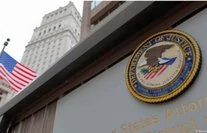The accused man had used anonymous accounts and wallets on OpenSea to conduct the transactions.
The US Justice Department charged a former product manager at OpenSea with wire fraud and money laundering. He had allegedly used confidential business information of what NFT projects would be featured on the platform to make a considerable profit. The official release stated this case was the first-ever digital asset insider trading scheme.
Accused of Insider Trading
The defendant – 31-year-old Nathaniel Chastain – was accused of secretly buying 45 NFTs in advance of them being featured on OpenSea’s homepage from June to September 2021, as reported by Reuters. The man was arrested on Wednesday, facing one count of wire fraud and one count of money laundering, each carrying a maximum sentence of 20 years in prison.
According to the official release, Chastain’s responsibilities with OpenSea included “selecting NFTs to be featured on OpenSea’s homepage.”
With pre-advance knowledge of which ones would be launched on the site – usually leading to an increasing volume and surging prices – Chastain first bought the NFTs and then sold them immediately after they were listed on the platform “at profits of two- to five-times his initial purchase price.”
The man had concealed the fraud by using anonymous digital currency wallets and accounts on OpenSea, the release noted.
FBI Assistant Director-in-Charge Michael J. Driscoll considered Chastain’s offense an age-old insider trading scheme and added that the authority would continue deploying forces to target acts of market manipulation in the digital assets space.
“With the emergence of any new investment tool, such as blockchain supported non-fungible tokens, there are those who will exploit vulnerabilities for their own gain. The FBI will continue to aggressively pursue actors who choose to manipulate the market in this way.”
Authorities Focusing on NFTs-related Crimes
With the rising popularity of NFTs, an increasing number of crimes in the field – like rug pulls and insider trading – caught the attention of authorities worldwide.
In March, the US Justice Department charged two NFT rug-pullers responsible for the a-million-dollar worth Frosties scheme with the conspiracy to commit wire fraud and money laundering. The men had reportedly stolen a total of 356.56 ETH.
A month earlier, the UK tax authorities HM Revenue and Customs (HMRC) seized three NFTs worth around $6,700 at that time amid the investigation of a $1.9 million financial scheme. The crackdown was the agency’s first confiscation of non-fungible tokens.

